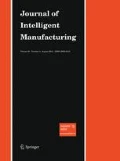Abstract
This paper briefly presents a new information modelling methodology useful as an information systems development approach. The methodology is based on a set of fundamental abstraction mechanisms which provide the means for modelling on a number of abstraction levels and, on the highest levels, the most invariant components and structures of the information model can be identified and defined. It is also based on the object-oriented paradigm which is applied in harmony with the abstraction mechanisms. The methodology introduces an alternative to the traditional entity relationship technique with respect to modelling of information and on this basis it can support efforts to construct reusable, extensible and reliable information systems.
Similar content being viewed by others
References
Avison, D. E. and Fitzgerald, G. (1988) Information Systems Development: Methodologies, Techniques and Tools, Black-well Scientific Publications, Oxford.
Bancilhon, F. (1992) Understanding object-oriented database systems, in Proceedings of the 3rd International Conference on Extending Database Technology (EDBT '92), Vienna, 23–27 March, Springer-Verlag, Berlin.
Bertalanffy, L. von (1967) General theory of systems-application to psychology. Social Science Information, 6, 125–136.
Booch, G. (1986) Object-oriented development. IEEE Transac-tions on Software Engineering, SE-12(12)
Booch, G. (1994) Object-Oriented Analysis and Design with Ap-plications, 2nd edn, Benjamin/Cummings, Redwood City, CA.
Boulding, K. (1956) General systems theory-the skeleton of science. General Systems, 1, 11.
Chen, P. (1976) The entity-relationship model-toward a unified view of data. ACM Transactions on Database Systems, 1, 9–36.
Coad, P. and Yourdon, E. (1990) Object-Oriented Analysis, Yourdon Press.
Coad, P. and Yourdon, E. (1991) Object-Oriented Design, Yourdon Press.
Codd, E. F. (1970) A relational model of data for large shared data banks. Communications of the ACM, 13(6), 377–387.
Codd, E. F. (1979) Extending the database relational model to capture more meaning. ACM Transactions on Database Systems, 4(4), 397–434.
Copeland, G. and Khoshafian, S. (1986) Object identity, in Proceedings on OOPSLA, Portland, OR.
Hammer, M. and McLeod, D. (1978) The semantic data model: a modelling mechanism for data base applications, in Pro-ceedings of ACM/SIGMOD International Conference on Management of Data, Austin, TX, pp. 144–156.
Jacobson, I. (1992) Object-Oriented Software Engineering, Addison-Wesley, Reading, MA.
Martin, J. (1990) Information Engineering, Prentice Hall, Englewood Cliffs, NJ.
Rock-Evans, R. (1978) Analysis Within The Systems Life Cycle, Pergamon Infotech Limited, Oxford.
Rosch, E. (1978) Principles of categorisation, in Cognition and Categorization, Laurence Erlbaum, Hillsdale, NJ.
Rumbaugh, J., Blaha, M., Premerlani, W., Eddy, F. and Loren-sen, W. (1991) Object-Oriented Modelling and Design, Prentice Hall, NJ.
Smith, J. M. and Smith, D. C. P. (1977a) Database abstractions: aggregation. Communictions of the ACM, 20(6) 405–413.
Smith, J. M. and Smith, D. C. P. (1977b) Database abstractions: aggregation and generalization. ACM Transactions on Database Systems, 2(2), 105–133.
Sowa, J. F. (1984) Conceptual Structures: Information Processing in Mind and Machine, Addison-Wesley, Reading, MA.
Author information
Authors and Affiliations
Rights and permissions
About this article
Cite this article
JØRGENSEN, K.A. Information modelling: foundation, abstraction mechanisms and approach. Journal of Intelligent Manufacturing 9, 571–581 (1998). https://doi.org/10.1023/A:1008844404518
Issue Date:
DOI: https://doi.org/10.1023/A:1008844404518




